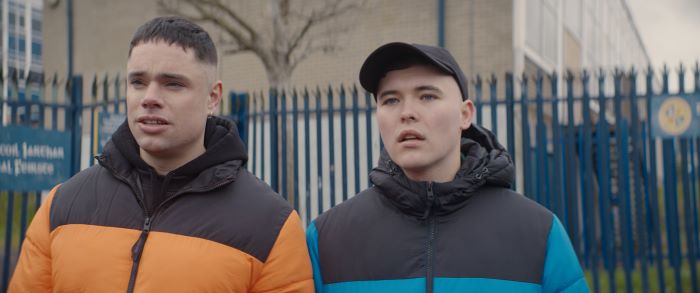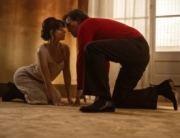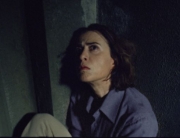
Naoise Ó Cairealláin, left, and Liam Óg Ó Hannaidh in Kneecap (Ryan Kernaghan/Sony Pictures Classics)
Language is more than just a set of words and grammatical rules. Each “mother tongue” represents a portion of power and pride, a semiotic force that confers identity and history. In Kneecap, the Irish language shares the spotlight with the unusual, but true, story of two young rappers (and stoners) from West Belfast who, with their music, gave a loud voice and renewed life to their language beyond its borders.
It sounds like an inspiring story that could easily be told in sentimental terms. Director Rich Peppiatt, in his feature debut, teams up with the actual members of the hip-hop group Kneecap to tell the story of their origin, though mixing facts with artistic flourishes that seem to take Danny Boyle’s Trainspotting (1996) as their cinematic bible. In their hands, the movie avoids transforming into a stiff and sober biopic. The members of Kneecap star in the fiction of their own lives to create a piece of self-mythology. It’s part of a tradition that has less to do with the current boom of musical biopics about rock and pop artists and more with the Beatles in A Hard Day’s Night or the Spice Girls in Spice World (the peak and nadir of this tradition, respectively).
Thus, Liam Óg Ó Hannaidh, Naoise Ó Cairealláin, and JJ “DJ Próvaí” Ó Dochartaigh portray semi-fictionalized versions of themselves before their fame and success. In post-Troubles Northern Ireland, brothers Liam and Naoise are raised by a radical father, Arló (Michael Fassbender), an IRA paramilitary leader, who teaches them not to let the language imposed by the British crown (English, of course) be their only form of communication. They grow up listening to and repeating the mantra that every word spoken in Irish represents a “bullet for freedom,” although the rest of their childhood and adolescence is marked by the presence of a mother (Simone Kirby) who has a much more critical view of the radicalism after Arló pretends to fake his death to escape the police after his direct involvement in a car bombing.
The Cairealláin brothers built their particular revolutionary idea of how to fight against the language and tactics of the colonizer without the supervision of a father. As a consequence, they get into trouble for criminal activities: vandalism, drug trafficking (and consumption), and insubordination to authorities (both the police and the paramilitary group their father once led).
The almost accidental, almost predestined birth and formation of Kneecap happens thanks to Liam’s temporary arrest and interrogation in which he stubbornly refuses to speak English to a police force incapable of translating his insults and profanities that would surely make his situation worse if understood. This is why the voluntary services of a civilian like JJ, a respectable figure in his community as a high school music teacher, are required.
However, the teacher takes a discreet stance in favor of the boy as soon as he listens to Liam and glances at a diary that has been confiscated. JJ devises a scheme to pretend to translate a lucid exposition of defense arguments to get Liam released while also taking advantage of a temporary distraction to hide the diary, which contains verses in Irish that inspire the former musician. After other providential coincidences, a curious friendship and creative association begins between JJ and the two rebellious youths to create music in his garage, and also to give this mentor, two decades older, a radical change to his life. This will come at a price, such as risking his job, marriage, and respectability. They take the name Kneecap as an Irish inside joke: Kneecaping means the practice of shooting at the knees, which was a notorious form of punishment among Irish paramilitary groups.
The best moments of the movie involve the group’s music, sometimes staged as musical numbers and other times as performances in bars or concerts. Meanwhile, the defiant charisma of these non-professional actors is convincing, but the big acting surprise is DJ Próvaí in his dramatic arc of a bored teacher going through a midlife crisis with fruitful results. He could easily make us believe he was born for the cameras (curiously, he is the group member who always covers his face with a balaclava bearing the Irish flag when performing). The sometimes excessive prominence of drugs (and hallucinatory experiences in which the camera and the editing embodies the feeling of being high) end up becoming somewhat superficial and repetitive. Still, Kneecap offers more than a good time. The film presents an electric and youthful postcard of contemporary Ireland, pays tribute to a language that resists censorship or obsolescence, and introduces viewers to original songs that they will immediately want to add to their Spotify playlists.
















Leave A Comment